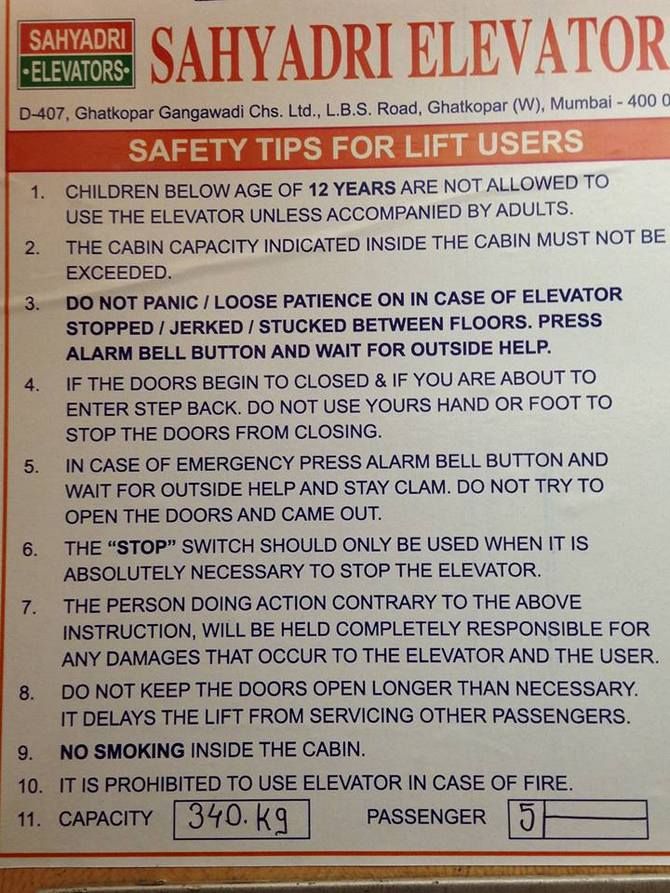 We came across this list of instructions in an elevator (pictured below). And it bothered us to no end!
We came across this list of instructions in an elevator (pictured below). And it bothered us to no end!
But it also seemed to be a perfectly good topic for this week's English lessons.
So here we go:
1. Children below age of 12 years are not allowed to use the elevator unless accompanied by adults.
Seems like a perfectly innocent sentence? Here's what it should read like:
Children below the age of 12 years are not allowed to use the elevator unless accompanied by an adult.
Articles are modifiers that appear before nouns or noun phrases. They help clarify the meaning of the noun.
The good news is that there are just three articles in the English language -- 'a', 'an' and 'the'.
If the noun is definite, it takes the article 'the'.
In this sentence, we know exactly how old one needs to be to travel in the elevator alone.
Hence, 'Children below the age of 12...'
And why doesn't 'children' take an article before it? Why doesn't the sentence start with 'the'?
That's because it makes its assertion about all children below the age of 12 years travelling in the said elevator.
And finally, we assume that the makers of the elevator would have no problem if the said child would be accompanied by one adult (and not two or more adults as the instructions suggest).
Therefore say:
Children below the age of 12 years are not allowed to use the elevator unless accompanied by an adult.
2. The cabin capacity indicated inside the cabin must not be exceeded.
There are two problems with this sentence:
a. Repeating words in the same sentence (except under very rare instances) is avoidable. The word 'cabin' has been used here twice.
b. The instructions have been nailed inside the elevator, making the phrase 'inside the cabin' redundant.
Simply say: The cabin capacity must not be exceeded or Do not exceed the cabin's capacity.
3. Do not panic / loose patience on in case of elevator stopped / jerked / stucked between floors. Press alarm button and wait for outside help.
The (several) spelling and grammatical errors aside, these sentence are way too complicated.
The better way to say it: Don't panic if the elevator stops in between floors or lurches. Press the alarm button and wait for help.
4. If the doors begin to closed & if you are about to enter step back. Do not use yours hand or foot to stop the door from closing.
Yet again, the several grammatical inconsistencies aside, this is what the good folks at Sahyadri Elevators are possibly trying to say:
Don't force the elevator's doors open.

5. In case of emergency press alarm button and wait for outside help and stay calm. Do not try to open the door and came out.
Yet again a repetition of point number three and four:
In case of an emergency, don't panic; don't force the doors open.
6. The "stop" switch should only be used when it is absolutely necessary to stop the elevator.
This could simply be rephrased thus:
Use the 'Stop' button only when necessary!
7. The person doing action contrary to the above instruction, will be held completely responsible for any damages that occur to the elevator and the user.
Damage to the elevator, we get. Damage to the user?!?
We often tend to complicate our sentences. The best way to speak any language correctly is to say things as they are.
In this case: If the instructions are not followed, the company cannot be held liable for any losses caused.
8. Do not keep the doors open for longer than necessary. It delays the lift from servicing other passengers.
Though not incorrect, this particular instruction could also be made simpler.
Thus: Do not keep the doors open for longer than necessary; it causes inconvenience to others.
9. No smoking inside the cabin.
Could simply be rephrased as: No smoking!
Because you are inside the elevator cabin, it is understood that the rules are restricted to that particular area and not beyond.
10. It is prohibited to use the elevator in case of fire.
Who is the 'it' that is being prohibited from not using the elevator in case of a fire?
(Do refer to the rule about articles in point number one as well.)
Therefore say: You are prohibited from using the elevator in case of a fire.
Are there more #Indianisms you can think of?
We would love to hear from you!
Post your gems on ZaraBol -- #Indianisms -- and we will publish the best ones right here on Rediff.com!
Lead image used for representational purposes only.
Photograph: Andrew McCluskey/Creative Commons









